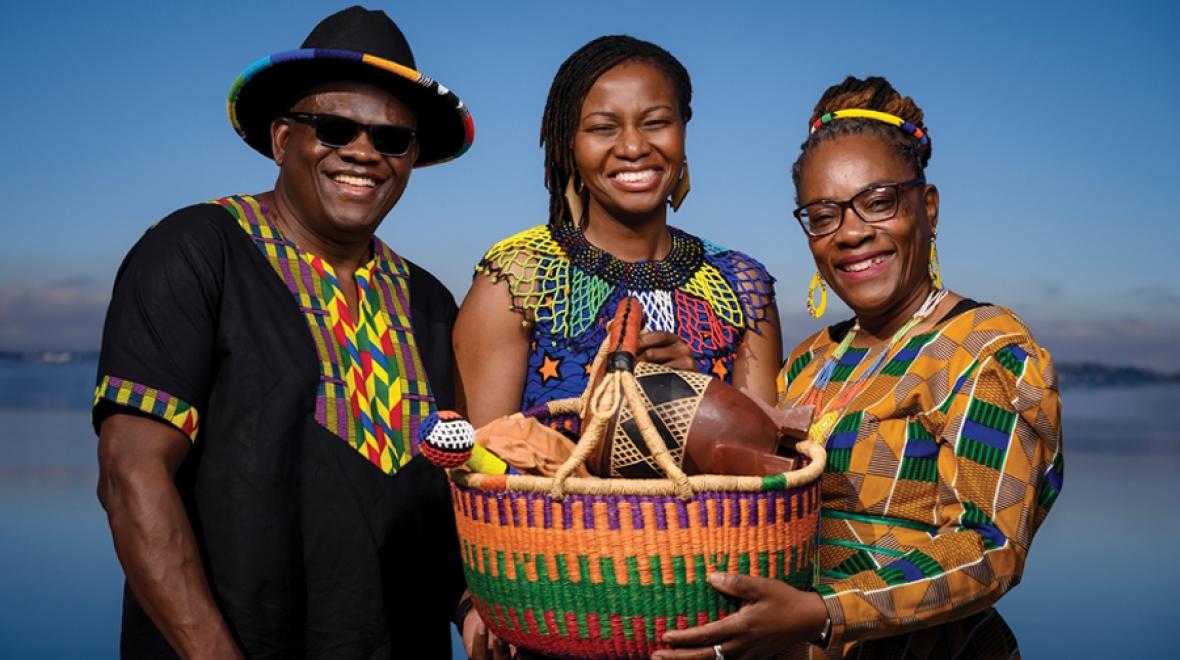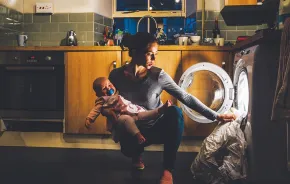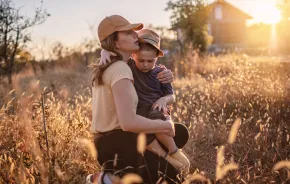
Photo:
Left to right: Ken Chikonzo, Mwa Hungwe and Ranga Chikonzo. Photo credit: Will Austin
Originally from Zimbabwe, Ken and Ranga Chikonzo had only lived in the U.S. for a few years when they lost their oldest daughter, Laura, to cancer in 2021. But the local community rallied around them to support them through their pain. To honor Laura’s memory, the couple formed Ubuntu Nerudo, an organization that pays forward the care and support they received. In the Shona language of Zimbabwe, ubuntu means “together” and nerudo means “with love.” Together with their niece Mwa Hungwe, they are building a loving community through the preservation and celebration of African heritage.
At the heart of Ubuntu Nerudo is the belief that “I am because we are.” Hungwe explains, “That is the essence of human beings. As much as we walk in life as individuals, we are really a community. We need each other. As much as we are different, we are strong together.”
Focused on the local Zimbabwean community, a group of more than 200 people keep in touch on WhatsApp. Posts to the group reveal individual and community needs. Whether that’s support in the immediate aftermath of a family member’s death, information about how to access health care or social connection for international students, the Ubuntu Nerudo community steps in to fill the gaps.
Noticing the prevalence of health problems like diabetes, group members began promoting healthy eating through traditional foods. The Chikonzos owned a small farm in Zimbabwe and understand the importance of culturally relevant foods to a healthy diet. Last year, they launched a partnership with Black Farmers Collective to grow culturally relevant foods. The work parties and shared meals at the farm are examples of nhimbe, the traditional collaborative work system of Zimbabwe; those events also offer a chance to experience nature and be reintroduced to food traditions that were lost when the country was under British colonial rule. Beyond the growing season, “Rhythm and Flavor” events give people a chance to connect with one another as they sample traditional foods, which are hard to find locally, and experience traditional music.
Ubuntu Nerudo connects parents with local musicians who teach children to play marimba and mbira, and with resources to learn some of the 16 official indigenous languages of Zimbabwe, including Shona, Swahili and Ndebele.
“Now we have children in our community who were born in America who are able to understand our language,” enthuses Ranga. One of them is Hungwe’s 5-year-old son, who learns Shona online with classmates from around the country.
“We used to talk about our little nephew in Shona. Now he listens and understands. It’s just amazing,” says Ranga.
A former banker, Ken noticed something else that needed to be addressed: Teens in the community who are coming of age in America don’t receive a financial education. Ubuntu Nerudo’s next community event will be a financial education workshop for teens. The founders’ dreams for Ubuntu Nerudo are as big as their dreams for the young people in the community. They hope to lead a travel group to Africa next year to show people firsthand that Africa is not like what people see on TV. And eventually, they hope to build a community center modeled after African villages, where they can host festivals and a community garden to provide space for people of African descent to grow their own culturally relevant foods.
What book or podcast are you recommending right now?Ken Chikonzo: “The Body Keeps the Score” by Bessel van der Kolk. Part of my work is as a chaplain at Harborview Medical Center. People there are experiencing probably the worst state of their lives, and recognizing that we can safely assume each and every person has suffered some sort of trauma in their life has given me a fresh perspective to be patient with people, to try to understand their worldview and why they behave in the way they do. Ranga Chikonzo: “Building People, Building Dreams” by Tom Deuschle. Tom Deuschle is an American who relocated to Zimbabwe 40 years ago, and he has really done a lot of work in Zimbabwe. He has impacted both of us because he was our pastor in Zimbabwe. He teaches to build others, to build people’s dreams. It’s a very powerful book. Hungwe: “Shepherding a Child’s Heart” by Tedd Tripp. My husband and I talk about how we don’t want to mess this [parenting] up. We want him [their son] to be a responsible citizen, to add value to this world and we do not want to be the reason that he doesn’t. My neighbor has amazing kids, and she recommended that book. It was helpful and practical. How can parents teach children to repair a broken world?Ranga Chikonzo: By not telling them to do things, but by doing them. Not telling them to love, but by being genuine and loving with people. Be there for people because kids are not what we tell them to be, they are what we are. I think we should also encourage parents to meet their kids where they are, and if you have more than one child, not to compare the children, because each child is different. Accept our kids for who they are and encourage them — especially in their failure. It’s easy to love your child when they are doing so well, but when they are failing, just be there and encourage them to look at the lessons to learn. Ken Chikonzo: We need to teach tolerance, we need to teach acceptance. We need to teach unity in diversity, and we need to teach children that it’s okay to be different. Differences do not have to cause us not to love one another. Hungwe: I feel so honored to even be asked that question. Do I even know what to do? What I have been trying to do is talk to [her son] like he’s a human being. One of the things we did not have growing up was that voice — you do not talk back to your elders! — which I really had to unlearn, because it became such an impediment. So I tell my son all the time, ‘Your voice has so much power. You want to use your voice.’ I try not to get mad and to take a step back and say, ‘Mommy’s upset, do you understand why?’ and ‘If you disagree, tell me, and we can talk about why.’ And we get into some real conversations. But he’s very aware that there are consequences — we have to keep that balance. What daily habit or routine is important to you?Ranga Chikonzo: Walking. I find so much peace in nature. It gives me joy. Ken Chikonzo: Reading my Bible and reflecting or meditating. It helps to keep me grounded and centered. I like to take that time in the morning to just be alone with God. Hungwe: Waking up early. I get to do a lot because I wake up early. I wake up at 3 o’clock, do my meditation and prayer and my workout, and go to work at 5. I’m done by 1, and that opens up my day to volunteer at school or do my own stuff. That schedule has been life-changing for me. It’s helped me stay consistent because the morning is quiet. Sometimes you go to work, you have a bad day and you’re like, ‘I’m not going to work out.’ I do sleep in on Saturday; I wake up at 6, but it has to be early enough to do my routine. |











